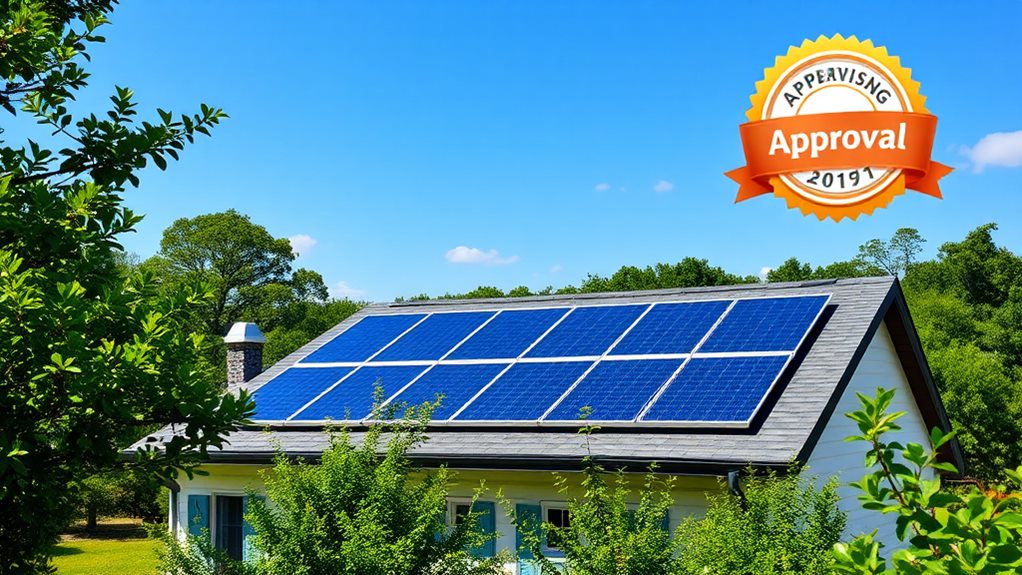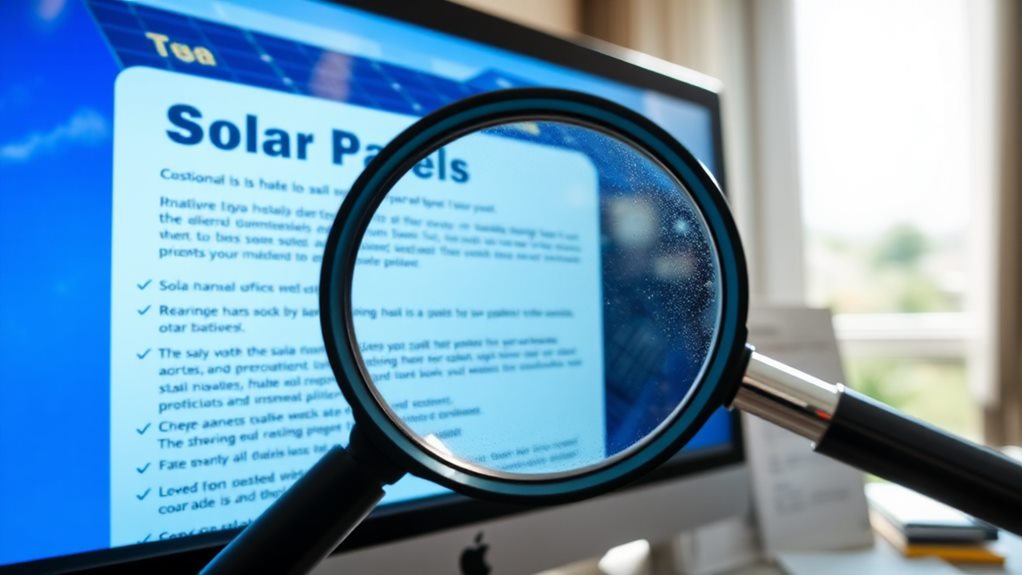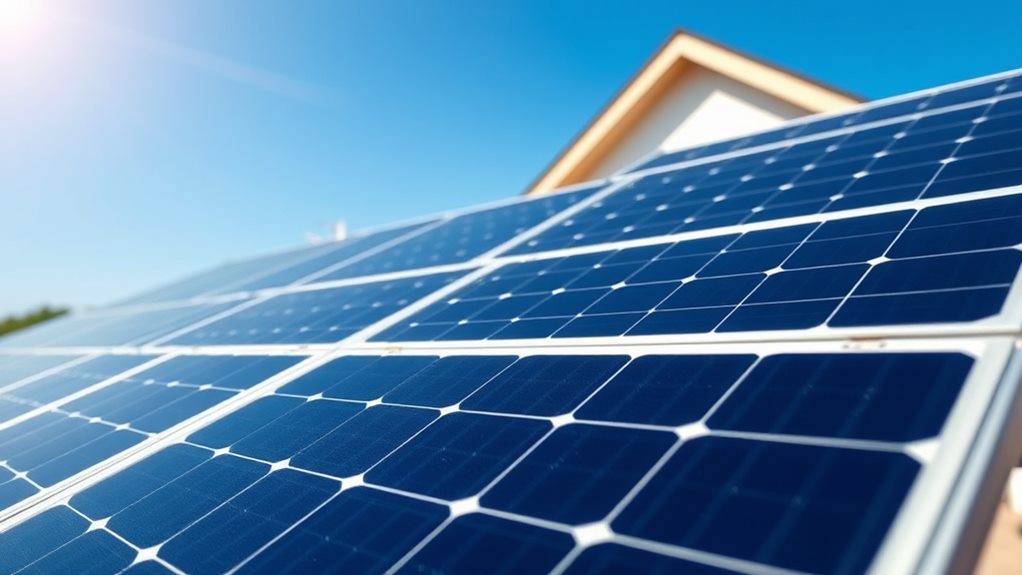When choosing solar panel installers, prioritize their credentials and experience; verify licenses and check affiliations with reputable organizations. Compare at least three detailed quotes, focusing on transparency regarding costs and warranties. Assess the quality of equipment, looking for high-performance ratings, and understand warranty terms. Investigate customer reviews across various platforms to gauge reliability and accountability. Understand local regulations and potential incentives that could affect your installation. Finally, weigh the overall value beyond just price, ensuring effective communication with your chosen installer. By considering these factors, you'll make an informed choice that aligns with your energy goals. More insights await.
Approved Solar Retailers

When choosing a solar panel installer, it's vital to start with approved solar retailers to guarantee you're making a smart investment. These retailers are certified through the National Energy Tenant Customer Code (NETCC), assuring they comply with local standards.
You'll want to verify that your installer holds accreditation from the Clean Energy Council, as this assures adherence to industry best practices. In addition, it's wise to explore local incentives and financing options that can enhance your savings and make your solar installation more affordable.
It's essential that the system design is created by a designer accredited by the Clean Energy Council. This accreditation assures the system is optimized for performance and compliance with necessary regulations.
Moreover, check that the retailer follows the New Energy Tech Consumer Code, which safeguards consumers and promotes fair practices within the solar industry.
Don't overlook local regulations that may impact your solar installation. These can vary greatly by region, and staying informed will help you avoid potential pitfalls.
Installer Accountability
Choosing a solar panel installer means considering their accountability, which plays an essential role in guaranteeing a successful installation. You should inquire whether the installer uses subcontractors, as directly hired installers often provide better accountability and service quality.
It's beneficial to seek recommendations from neighbors who've previously installed solar systems; their experiences can help you gauge the reliability of local solar providers. Additionally, consider looking into available solar energy incentives that could impact the overall cost and installation experience.
Evaluate the installer's reputation within the community. A strong track record of successful projects and positive customer experiences is a good indicator of accountability. When evaluating solar installer companies, pay attention to those that offer clear channels for customer service and support. This commitment to addressing issues promptly reflects their dedication to maintaining accountability throughout the installation process.
Furthermore, guarantee that the installer practices transparency in their business dealings. This openness fosters trust and enhances the overall customer experience.
Research and Reviews

When choosing a solar panel installer, it's essential to research their online reputation thoroughly.
Check third-party review platforms for honest customer feedback, paying attention to both positive and negative insights.
Additionally, look for installer qualifications and certifications that can further assure you of their reliability.
Online Company Reputation
A solid online reputation is essential for finding a reliable solar panel installer. Start by conducting thorough online searches for company reviews, focusing on third-party platforms like Google, Yelp, and the Better Business Bureau. These sources provide unbiased feedback that can help you gauge a company's reliability.
Additionally, exploring how previous customers have benefited from their solar energy systems can give you insight into the long-term savings associated with solar investments. Pay special attention to both positive and negative reviews, as negative reviews can reveal potential issues or recurring problems with specific installers, offering insight into customer experiences.
Be cautious of companies that incentivize positive reviews, as this practice can skew perceptions of their service quality and reliability. To better assess an installer's online company reputation, analyze the ratio of positive to negative reviews. A higher number of positive reviews may indicate a trustworthy solar panel installer, while a considerable presence of negative reviews could raise red flags.
Look for specific references to the installer's communication, service quality, and workmanship within these reviews. These factors are critical indicators of the overall customer experience and can greatly influence your decision.
Ultimately, a thorough investigation of online company reviews will empower you to make an informed choice for your solar panel installation.
Negative Insights Analysis
Negative insights from customer reviews serve as a valuable tool in evaluating solar panel installers. Focusing on negative reviews can uncover essential information about potential issues and red flags related to service or installation quality.
As you research, look for patterns in complaints across various platforms. If multiple customers report similar problems, it may indicate systemic issues with the installer.
Be cautious of companies that incentivize positive reviews, as this may skew the overall impression of their reliability and service quality. Such practices can mask genuine concerns regarding customer service and installation practices.
To get a clearer picture of an installer's reputation, consider utilizing third-party review platforms like the Better Business Bureau. These sources often provide unbiased feedback, allowing you to assess the installer's track record more accurately.
Third-Party Review Platforms
Customer reviews play a pivotal role in evaluating solar panel installers, and utilizing third-party review platforms can enhance your understanding of their service quality. Platforms like Google Reviews, Yelp, and the Better Business Bureau offer valuable insights into customer experiences and satisfaction levels.
These sites often feature detailed reviews that showcase both positive experiences and negative complaints, allowing you to identify patterns in installer reliability.
When using these review platforms, focus on the overall sentiment of the reviews, as well as the volume of feedback. A higher number of reviews can indicate a more reliable installer, while consistent positive feedback suggests quality service over time.
Additionally, many review sites enable you to filter reviews by date, which helps in gauging whether an installer has maintained service quality consistently.
However, be cautious of businesses that incentivize positive reviews, as this can skew perceptions of their services.
Pricing Considerations
When considering solar panel installers, understanding pricing is vital to making an informed choice. Begin by comparing at least three quotes to gauge market pricing and determine the average cost per watt for solar installations in your area.
Be cautious of heavily advertised systems with low prices, as they often compromise on quality and customer service, potentially leading to higher costs down the line.
When reviewing quotes, verify they include a thorough breakdown of costs, warranties, and support details.
Significant price differences can arise from variations in equipment quality, installation practices, and warranty terms. It's important to investigate any hidden costs that may come up after installation, such as maintenance fees, additional permits, or equipment upgrades.
Experience and Support

Choosing the right solar panel installer hinges on their experience and the level of support they provide. You should prioritize companies with at least five years of experience in the solar installation industry. This often correlates with a proven track record of successful installations, guaranteeing that you're entrusting your project to knowledgeable professionals.
It's crucial that the installer offers both technical and sales support, especially in Australia, as this facilitates better communication and problem resolution throughout the installation process.
Evaluate the reputation of the manufacturer's solar panels and inverters they use, focusing on brands known for quality and reliability.
Additionally, confirm that the installer is familiar with local conditions, as these can greatly impact system performance and installation practices.
Ongoing support after installation is essential; look for companies that provide maintenance services and system performance monitoring to confirm long-term satisfaction and efficiency.
Obtaining Quotes
Getting multiple quotes is crucial for making an informed decision about your solar panel installation. Aim to receive at least three detailed quotes from different solar installers to guarantee competitive pricing and a fair market assessment. Each quote should include an extensive system design, specifying equipment types, warranties, and installation details, which will facilitate effective comparisons.
As you review the quotes, don't hesitate to discuss and clarify reasons for any notable price variations. Understanding the quality of materials and services offered will help you identify what you're truly paying for.
Additionally, verify that all quotes account for potential hidden costs, such as permits, inspections, and any necessary upgrades to your existing electrical systems. These factors can greatly affect your overall project budget.
Cross-check the quotes against established benchmarks like SunSPOT estimates to validate the competitiveness and accuracy of the proposals you've received. This diligence not only leads to better financial decisions but also helps you choose a solar installer who meets your needs effectively.
Quality of Equipment

Investing in high-quality equipment is essential for maximizing your solar panel system's efficiency and longevity. When selecting solar panels, prioritize brands that offer strong performance ratings, focusing on efficiency percentages that typically range from 15% to 22%. This guarantees you're opting for panels that will produce peak energy throughout their lifespan.
Don't overlook the importance of inverters, as they're critical to your system's performance. Research commonly known failure rates associated with various inverter models to avoid potential issues that could affect overall efficiency. Established manufacturers usually provide better long-term durability and support, so seek out brands with a solid reputation in the market.
User reviews can also be invaluable; they give you insights into the real-world performance and reliability of the equipment you're considering. Additionally, assess the warranty covers for the equipment.
Solar panels often come with product warranties ranging from 5 to 25 years, alongside performance warranties that address degradation over periods of up to 25 years. By focusing on the quality of equipment, you can enhance your solar panel installation's effectiveness and guarantee a reliable energy solution for years to come.
Warranty Importance
Understanding the importance of warranties is fundamental when selecting solar panel equipment. Warranties serve as a safety net for your investment, guaranteeing both material and performance reliability over time. A product warranty typically ranges from 5 to 25 years, providing assurance that your solar panels will function as intended.
Performance warranties often extend to 25 years, guaranteeing a minimum level of energy production, which is essential for maintaining efficiency.
Inverter warranties, which usually last between 10 to 25 years, are equally important. Selecting inverters with longer warranties can greatly enhance your system's longevity and overall performance.
Additionally, labor warranties, spanning from 1 to 10 years, cover potential installation errors, giving you peace of mind regarding the quality of workmanship.
It's important to understand the terms and conditions of these warranties, including what they cover and the claims process. By thoroughly evaluating warranty importance, you can protect your investment and provide ongoing support.
This knowledge empowers you to make informed decisions, ultimately contributing to the long-term success of your solar energy system.
Comparing Estimates

When comparing estimates from solar panel installers, it's crucial to gather at least three detailed quotes to guarantee you're looking at competitive pricing and options.
Each quote should clearly outline costs for equipment, labor, permits, and any additional fees, allowing you to assess transparency.
If you notice significant price discrepancies, discuss these directly with the installers to gain insight into the differences and make certain you're making an informed decision.
Evaluating Price Discrepancies
Navigating through the world of solar panel estimates can be overwhelming, especially with price discrepancies that often arise between different installers. When evaluating price discrepancies, it's vital to gather multiple quotes from various solar companies. Each estimate should include a detailed system design, enabling you to accurately assess the proposed equipment and installation methods.
Don't hesitate to ask installers to explain any substantial differences in their quotes, focusing on aspects like equipment quality, warranties, and installation processes. As you compare these estimates, keep an eye out for hidden costs that may surface after installation, such as maintenance fees or potential equipment upgrades. These costs can greatly impact the overall value of your investment.
To guarantee you're making an informed decision, utilize resources like SunSPOT estimates or industry benchmarks to cross-check your quotes against average pricing in your area. This can help you avoid overpaying for your solar system.
Comprehensive Quote Breakdown
As you immerse yourself in comparing solar panel estimates, a detailed quote breakdown is crucial for making an informed choice. A thorough quote breakdown should detail system components, installation costs, and any additional fees, allowing you to assess the value accurately.
Look for quotes that specify the type and brand of solar panels and inverters proposed, including their efficiency ratings and warranties. This information is essential for making informed comparisons among solar contractors.
Don't overlook potential upgrades, like switchboard modifications, that could affect your overall installation costs. Make sure these are transparently included in each quote for consistency.
Additionally, check if all estimates account for local regulations, permits, and inspection fees, as these can vary greatly and impact total installation costs.
Final Considerations
Before finalizing your decision on a solar panel installer, it's important to weigh the overall value of the installation. Look beyond just the price; consider the quality of the solar system and the warranties offered. A strong warranty can safeguard your investment and provide peace of mind over the years.
Ensure clear communication with the installer regarding all terms and conditions, including installation timelines and maintenance responsibilities. Understanding the installation process is critical, as it includes necessary permits and inspections that could lead to unexpected delays or costs if overlooked.
Additionally, evaluate the installer's customer service. Their responsiveness and support during your decision-making can indicate the level of assistance you can expect post-installation. This support is significant, as it can greatly impact your experience and satisfaction with the system.
Final Thoughts
In summary, selecting the right solar panel installer is essential for maximizing your investment. With about 50% of solar installation costs attributed to labor, choosing a qualified installer can greatly impact your system's efficiency and longevity. By following these tips—evaluating approved retailers, checking reviews, and comparing estimates—you guarantee that you make an informed decision. Prioritizing quality and accountability not only enhances your solar experience but also contributes to a more sustainable future for all.


Recent Comments